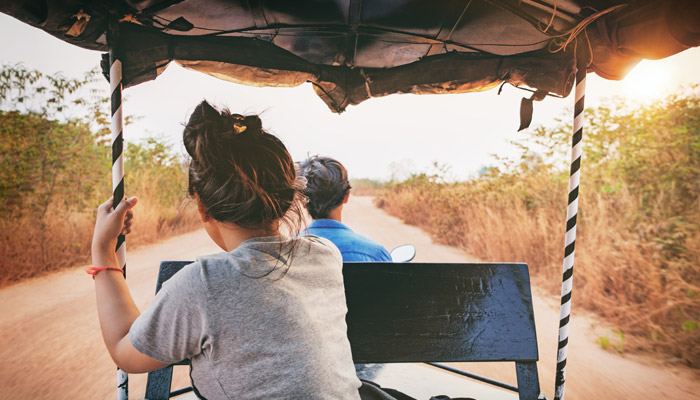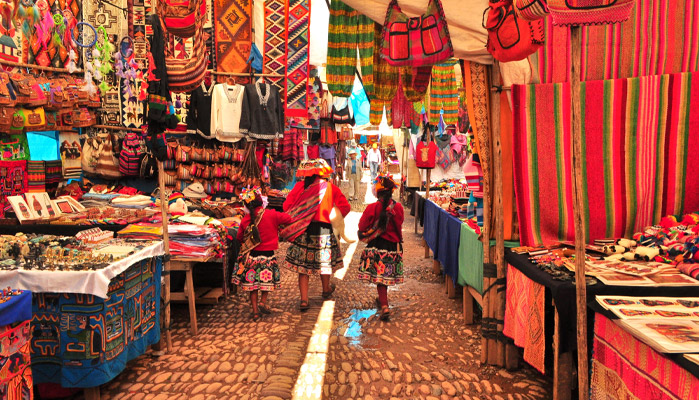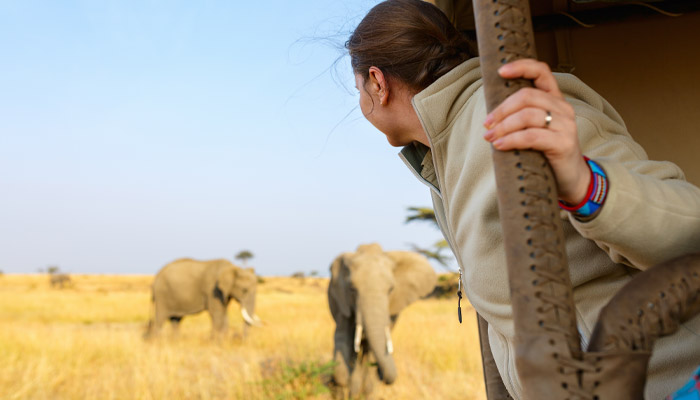To celebrate our 33rd birthday in 2020 we have decided to provide 33 tips on how to act responsibly when you’re on the road. Responsible travel is something that we passionately adhere to at Tucan Travel. Travelling responsibly requires travellers to adopt a certain attitude, showing respect to local cultures, economies and the environment. It is our core belief that when travelling in a foreign nation, travellers should do their utmost to give as much as they can back to the communities that they visit, not only to support those that need it most but also to ensure the survival of the cultures that make this planet so fascinating. We acknowledge that tourism has become one of the more significant contributors to global warming in recent years, but still vehemently believe in the positive effects that travel can have on the world. We therefore make every effort to ensure that our tours are as sustainable as they feasibly can be.
We do everything in our power to help our tours become more responsible, but it also requires effort on an individual level from those who are travelling with us. Here are 33 tips to help you reduce any potentially detrimental effects on the countries that you are visiting, and the planet as a whole, by travelling as responsibly as possible.

Waste:
1. We always advise those travelling with us that they follow the three Rs when it comes to waste: Reduce waste in all of its forms, Reuse resources wherever possible and Recycle at every opportunity. It’s a simple but effective formula to follow and if followed by all travellers could see a monumental change in the negative effects of tourism.
2. Invest in a refillable water bottle. This relatively cheap and incredibly simple remedy could result in a vast reduction in the number of unnecessary plastic bottles that are in circulation on our planet. Statistics suggest that nearly a million plastic bottles are sold globally every minute, yet less than one fifth of the world’s plastic waste actually gets recycled. It is also a smart idea to purchase a bottle with an in-built filter, allowing you to refill from any non-saltwater source.
3. Save water and electricity wherever possible. Simple steps like taking a shower rather than a bath or switching off the light when leaving a room may seem relatively inconsequential but it all adds up. You should also be cautious when using hotel washing services, as they often wash travellers clothes separately, unnecessarily wasting both electricity and water. If you need to do a wash try teaming up with fellow travellers to reduce your wastage.
4. Pick up rubbish left by others. It can be incredibly frustrating to witness littering in all forms, particularly in areas of natural beauty, but there is a simple remedy – pick up the rubbish yourself and take it to the next available bin or recycling facility. Beach cleaning, where individuals spare just a few minutes of their day to clean rubbish from a littered beach, has recently become a popular activity for those on their travels. It takes very little effort but can have very effective and satisfying results.
5. Avoid fast fashion. When you’re on the road for a long time, it can be important to have a large and varied selection of clothing with you. It’s always tempting to simply replace a piece of clothing once you get bored of it, but fast fashion is a trend that causes a large amount of waste in contemporary society. In fact it can take as much as 2,700 litres of water to make a single cotton shirt – that’s enough water to keep an individual hydrated for 2 ½ years! Try to get as much use out of every bit of clothing you have whilst on the road before exchanging it for something new.
6. Bring your own bag. Whilst many establishments are dissuading the use of single use plastic bags across the globe, many are slightly behind the times regarding the importance of this matter. Bring your own bag with you when visiting markets, supermarkets or general shops in order to cut down on your personal plastic waste levels.

Transport & Accommodation:
7. Use public transport. Take public transport whenever you can – whether it be when travelling to your destination or travelling between locations after arriving at said destination. Public transport is one of the more responsible ways to travel both at home and abroad. By opting against driving themselves or using private transport, travellers can dramatically reduce the amount of CO2 emissions entering the earth’s atmosphere.
8. Walk whenever possible. Taking the public transport argument to the next level, we always promote the idea of walking between destinations when practical. Not only does this help almost entirely negate your individual carbon footprint, but also provides the added benefit of seeing and experiencing things that would otherwise have been bypassed. Often the greatest travel experiences are unintentionally stumbled upon.
9. Avoid unnecessary flights. In terms of transport, aeroplanes are the greatest contributor to the earth’s greenhouse gas problem. We therefore advise that travellers take a slower, more eco-friendly option wherever possible. Not only is this generally cheaper but you also get to see more of the countries that you’re travelling through. The amount of carbon dioxide generated from a single long haul flight can match the amount emitted by a single person throughout an entire year. When flying, try to book direct flights if you can – a plane’s take off and landing have the greatest detrimental effect on the environment, meaning changeovers accentuate your journey’s carbon footprint. We appreciate that most people must catch a flight to reach the majority of their holiday destinations, especially when short on time. Most tour operators are also guilty of this, but Tucan Travel are reassessing tour schedules in an attempt to reduce our travellers’ carbon footprints to the greatest extent possible.
10. Stay in locally owned accommodation. Doing this ensures that money will be going back into the local community, rather than towards global conglomerates. It is also advised that travellers avoid resorts and all inclusive establishments. The former are renowned for creating a lot of waste as well as rarely following eco-friendly procedures, whilst the latter discourage guests from paying visits to nearby local eateries. The truly adventurous amongst you could also opt for camping when appropriate.
11. Stay in eco-friendly accommodation when you can. Simple research can reveal whether or not any given hotel, hostel or guesthouse follows steps to reduce their negative effect on the environment. If you arrive at a hotel and realise that a few simple steps could reduce their carbon footprint then perhaps try politely letting them know. It may be unlikely that they will take your comments on board but if enough people put suggestions forward then it could become more of a necessity.
12. Stay close to the sights. If you stay near the sights that you wish to visit during your travels it means that you can walk everywhere that you need to go, negating the need to take transport of any kind. This not only lessens your carbon footprint but also has the bonus of letting you properly absorb your surroundings during your walks, noticing what you would otherwise have missed.

Go local:
13. Use local guides when you can. Using local guides has a positive effect on their community by supporting the local economy but also improves your overall experience, as local guides tend to have a greater knowledge of the sites at which they operate. There is also the added bonus of having someone that is familiar with the local culture and customs to add extra depth to your overall experience.
14. Eat like a local. By eating at local restaurants you will be giving money to those that need it most, as well as supporting a business that uses local produce. Eating locally also has the additional benefit of immersing you into the nation’s food scene, presenting another avenue of culture to explore. Try to avoid global chains whenever you can. Eating local produce is also extremely important, in order to avoid shipping – an exercise that leaves a significant carbon footprint. For example – given the opportunity to eat Scottish salmon in Bangkok, don’t take it.
15. Buy from local food markets. If buying fruit, veg or any other essentials, try to purchase from a local food market. Again, you’ll be supporting those who need it most but it is also more likely to help prevent the use of unnecessarily imported goods and needless plastics that supermarkets are more likely to use.
16. Buy locally made gifts and souvenirs. When buying souvenirs for yourself or others make sure that you buy them from local vendors and not larger souvenir shops – it’s always important to help out the little guy. Also ensure that you bring your own bag to prevent the unnecessary waste created by using plastic bags.
17. Consider potential consequences before giving money to locals. Everyone who has travelled to the less fortunate corners of the globe has probably experienced poverty in its most drastic forms. However, before giving money to those that seem to need it most first consider what may be going on behind the scenes. Often beggars are used as a means of gaining sympathy by criminals who exploit the process as an immoral cash cow. It is better to look into a social cause that has proven its benefit to those in need of help.
18. Respect local customs. It is of vital importance that travellers adhere to local cultural traits when visiting any country. Whether it be through dressing appropriately, refraining from disrespectful displays of affection or asking permission before taking someone’s picture, it is essential to respect the local way of life.
19. Do your research if visiting an orphanage or school. Unfortunately, such establishments have been known to exploit the children there, using them as a tourist attraction rather than focussing on the children’s best interests. Make sure you research whether the establishment that you wish to volunteer in actually has what’s best for the children at heart.
20. Be respectful in areas of poverty. Whether it be a vibrant Indian slum or a remote African tribal village, travellers are drawn to areas of poverty to gain a greater understanding of those who live under circumstances entirely unlike our own. Whilst there is nothing wrong with visiting these locations to gain a greater perspective on life, it is of vital importance that the residents be treated with respect – it’s not a zoo.
21. Speak the language where possible. Even if you have just managed to master a small collection of simple phrases, try and use the local language wherever possible. Simply saying “Hello”, “Thank you” or “How are you?” in the local tongue is not only respectful of customs and culture but will typically receive a very welcoming reaction from the members of the community.
22. Barter respectfully. Whilst bartering for items in a local market can be great fun and getting the price as low as possible gives one a feeling of great achievement, it is vital to consider the effects that your haggling may have. Scraping a few pennies off the price may not seem significant but that small amount of money will likely mean far more to the vendor than it would to yourself.

Wildlife:
23. Make sure that any wildlife establishment that you visit is responsible. Never visit wildlife “sanctuaries” known to mistreat or exploit animals in any respect. A simple bit of online research tends to reveal the true nature of unethical establishments. Wild animals should be seen in the wild or in a sanctuary that strives to save the species from any potential danger that it might face.
24. Never encourage animal exploitation. Whether wild or domesticated, using animals as a draw for tourism is something that should never be encouraged. Classic examples of this include elephant riding and tiger petting in Asia. These are wild animals and we should strive for them to be just that – wild.
25. Never buy wildlife products. This is an act that perhaps proves most detrimental to the planet’s rarest wildlife. The exchange of any wildlife product merely encourages the trade of such items and therefore indirectly supports poaching. This in turn leads to the diminutive population levels of endangered species diminishing further. The trade of these items is one of the prime reasons for more and more species approaching extinction in contemporary society.
26. Snorkel/dive responsibly. In a day and age that is seeing coral reefs diminish at an alarming rate, it is imperative that we do all that we can to make sure that these reefs are protected and prevent the issue from worsening. When diving or snorkelling, ensure that you don’t disturb the reef in any way by touching it, stepping on it or stirring up sediment. It is also important to use reef-safe suncream when diving or snorkelling so that sealife is not exposed to any harmful chemicals.
27. Do not feed wild animals. This one is relatively self explanatory – feeding a wild animal has the potential to have a drastic knock-on effect on the creature’s livelihood and even their environment.

Going the extra mile:
28. Pack eco-friendly items for your trip. Eco-friendly products are becoming increasingly easy to come by, whether it be ethically sourced shampoo in bar form or a toothbrush made from bamboo. Every such small act can help prevent further damage to the planet’s environment.
29. Check for seals of approval. When abroad, a surefire symbol of a business that strives to be sustainable is having a seal of approval from a renowned certification programme, such as UK-based Green Tourism. Some nations like Costa Rica have their own rating systems by which they grade responsibility initiatives within the country. If it has an official certification you can rest assured that it strives to be as sustainable as possible.
30. Share your sustainability tips online. If a place that you have visited goes above and beyond to meet the correct standards or alternatively fails miserably in doing so, let others know about this online. Not only will this encourage support for businesses that are making a conscious effort to be more responsible but may also see establishments that have been criticised make alterations in order to remedy their shortcomings.
31. Make your opinions known whilst there. If you feel that a few simple steps could help a local business become more responsible then don’t be afraid to make a few friendly suggestions. It may not make a difference right away but if enough people let them know then local establishments may start to listen. Make sure that you are very respectful not only of the business in question but also the local customs when making such suggestions.
32. Eat veggie. We appreciate that some people love meat too much to give it up altogether and there’s no issue with that. However, just occasionally cutting meat from your diet can help to reduce your carbon footprint, even if only on a minor scale. Plus in many countries, such as India and Nepal, vegetarian meals are the norm – this means that the most delicious food that you can buy is meat-free.
33. Research the best ways to be sustainable. We have covered a few of the key points above but the list would be almost endless if we pointed out every way in which more responsible travel can be achieved. Before you set off on your next epic trip across the world, spend some time researching the ways in which you can minimise the negative impact that you have on your destinations.


Good tips. I have been using these and keep them in mind while I travel. Thanks for sharing this amazing article 🙂